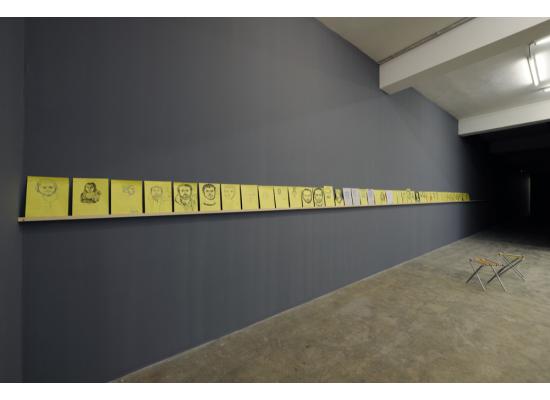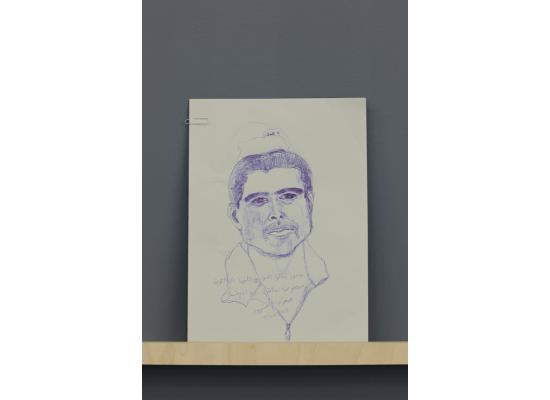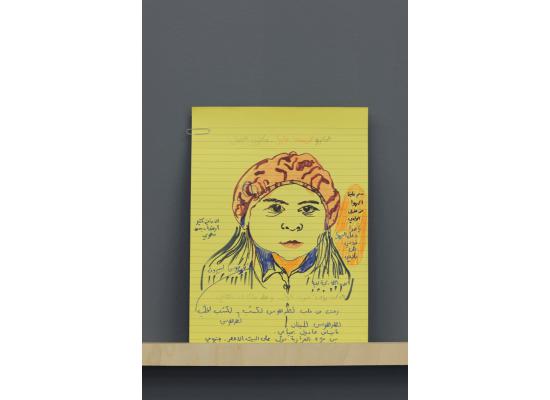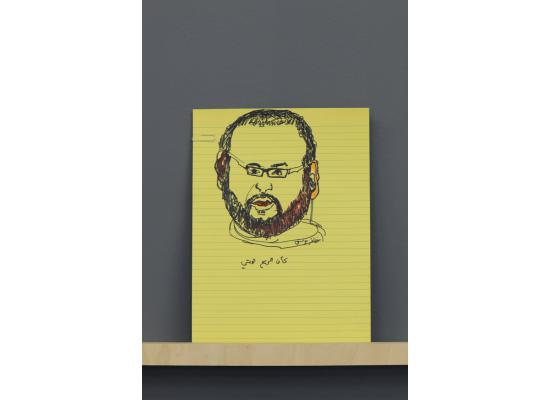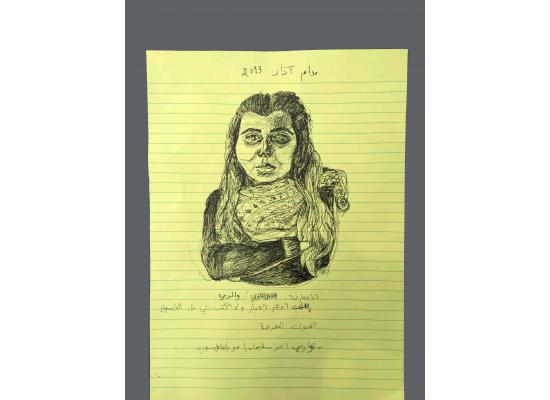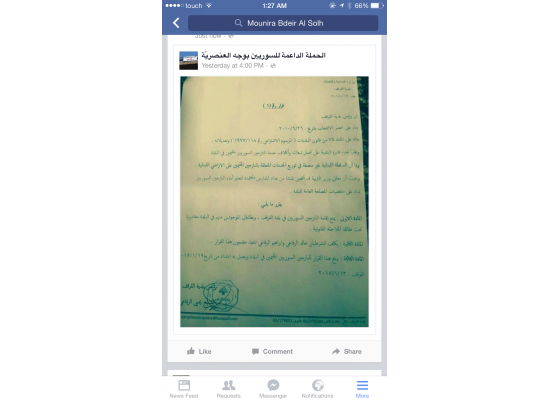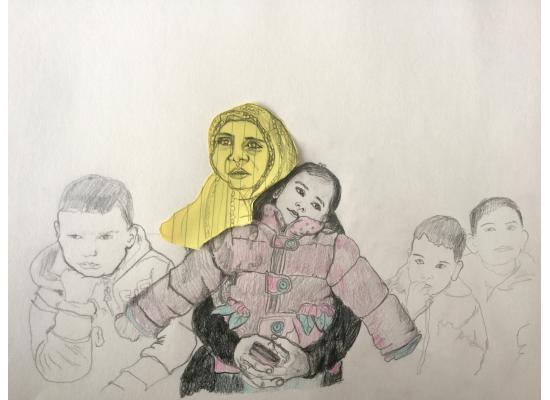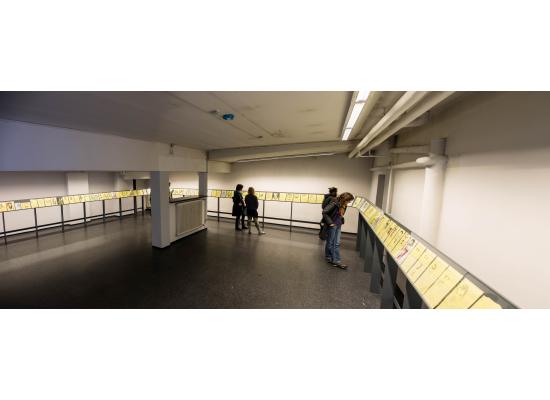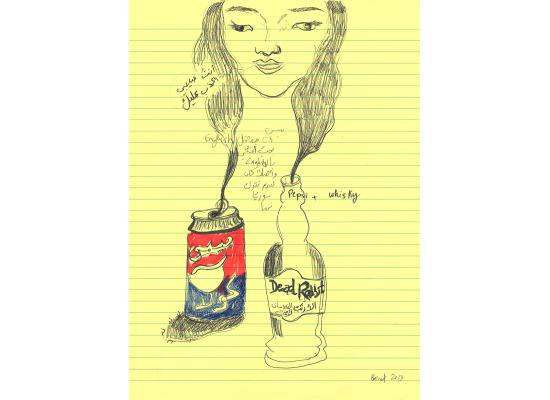This work began in 2012, as an ongoing series of portraits, or perhaps time documents. The series is made after directly meeting with Syrian individuals, Palestinians and others who were born or lived in Syria and who were forced to move to Lebanon in the last few years. The work is expanding, following the route and the path of many of those individuals who have now fled to other countries, after the residency permits' obligations for the Syrians in Lebanon have been made very hard to satisfy notably since 2015.
When I first started meeting with people, the Arab world was rising, and in the beginning there was much hope for change despite all the danger it entailed. Then, over the years, we reached another turn and the revolution soon had turned into a war against the people. Today, we are witnessing a regional war, happening on the grounds of Syria and expanding into Lebanon and around. A war that has deeply affected each and every individual, each and every family in Syria, not to mention Lebanon and the neighboring countries.
Over the time, I kept on recording all those changes. They manifested in bits and pieces of our conversations through drawings and my fragmented scribbles, compiling an ongoing and wide number of personal accounts. The accounts consist of diverse peoples’ personal stories and views and memories from Syria, furthermore, on political opinions, social and historical events that we discussed together, personal and public matters, going back to pre-Assad(s) times, until today, and thinking about our tomorrows. Stories include jokes more than moaning, chats and scribbles instead of finished texts are also resulting from those conversations.
Sketching each individual helps me get closer in flesh and blood to each person I draw, and taking notes helps me record the story and the diverse opinions and the notes on the diverse social structures mingling until today between Syria and Lebanon and our difficult shared history.
The drawings and interviews with the newcomers wherever in the world they are now, are noted on yellow legal pad, as well as various A4 papers, but mostly on legal pad, a typical yellow paged notebook that I consider as my drawing surface, and which allows me take notes at the same time as I fluidly draw and write simultaneously our conversations.
My encounters are affected by the fact that my mother is Syrian, and that I have lived in Syria during the Lebanese Civil war intermittently in my childhood; and that at that time, Syria was our refuge, as well as a refuge for many Lebanese families who's mothers or fathers were Syrians like in our case, most probably.
Language plays an important role in those drawings, whereby I write our conversations using the slang that we speak in.
What I am recollecting, is a way to capture my own history as a child, the traumas I have been through during the Lebanese Civil war, whilst observing a challenging and worthening unrest, yet a stubborn continuous line and patterns between wars and massacres in our region, leading to forced exile, whereby my Syrian as well as Lebanese family members have been affected. Throughout that work, I am recapturing my own Syria, and my own Lebanon to whom I do not anymore belong. Thier close and tensed relations, and how that might affect people. I am home everywhere today, and nowhere, because my initial homes have rejected me, as well as the hundreds of people I have met and drawn, and with whom I have had incredible conversations about our lives.
Around 2015, I continued drawing people, whom I met in various cities, and this has caused the opening of this work, by meeting with people from various backgrouds. Ironically enough, and sadly, after we participated in a fantastic revolutionnary movement in Lebanon, starting October 17 2019, and after a terrible economical break down, today, every other Lebanese is again trying to escape the country. Leading to a new wave of mass exodus for the Lebanese, next to massive empoverishment and killing.
-------------------------------------------------------
With thanks/reflection
To all individuals and families who accepted to meet me and share their time and stories with me. Over the years, this work has allowed me make friendships that have deeply affected and changed my perspective about pretty much everything. Table talks that have allowed me understand Syria, the Revolution and how it practically happened on the grounds in various cities in Syria. It allowed me follow and trace the aggressions of each incident, yet to understand poetics, irony, multi-faceted aspects of those incidents. The intensity for each individual and family to go through such facts, and to continue surviving after being forced to flee one’s home, soon after a Revolution has become a massacre, and quickly, one of the most atrocious open wars in today’s history. These accounts have allowed me also to understand another view on Lebanon, and how the Syrians look at Lebanon today.
When I followed the path of the people to Athens, then to Germany and other countries, such as Turkey and Morocco and the Netherlands and most recently to Chicago in the USA, I also encountered individuals and families who have other backgrounds than the Syrians, but I also met them and learned so much from their stories, for stories of oppression, and of exile, and how we got to re-make our lives over and over again, repeat themselves, and by writing them down I hope we would learn to avoid oppression in our global history of the human beings, we avoid the typical Lebanese oblivion, which is a sickening disease, resembling to when you have the sickness of the sea, when it comes to “forgetting” the massacres of your people and the people around you, even of your “enemies”, no matter where they came from.
--------------------------------------------------------
With special thanks to Basmeh & Zeitooneh/For Relief and Development at the Shatila Camp Community Center in Beirut, Melissa Network in Athens, Syrian Community Network in Chicago, and the list will be updated soon again.
-------------------------------------------------------
This ongoing work was made possible with generous support of Mondriaan Fonds, Mophradat (previously YATF), Kamel Lazaar Foundation, Sfeir-Semler Gallery, Documenta 14, and Chicago Art Institute.
